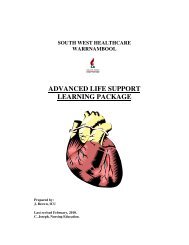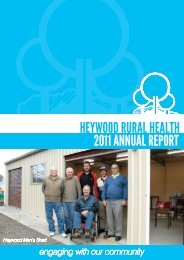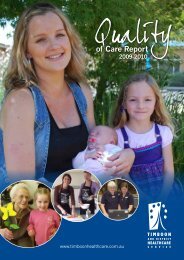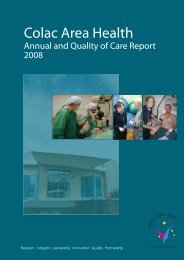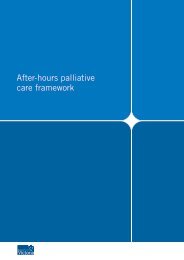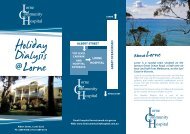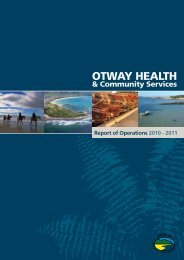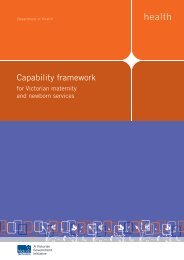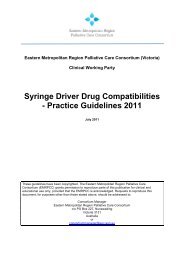- Page 5 and 6: 3 • Self Directed Learning Packag
- Page 7 and 8: 5 • Self Directed Learning Packag
- Page 11 and 12: 9 • Self Directed Learning Packag
- Page 13 and 14: 11 • Self Directed Learning Packa
- Page 16 and 17: 14 • The Palliative Approach Tool
- Page 18 and 19: 16 • The Palliative Approach Tool
- Page 21 and 22: 19 • Self Directed Learning Packa
- Page 24 and 25: 22 • The Palliative Approach Tool
- Page 26 and 27: 24 • The Palliative Approach Tool
- Page 28 and 29: 26 • The Palliative Approach Tool
- Page 30 and 31: 28 • The Palliative Approach Tool
- Page 32 and 33: 30 • The Palliative Approach Tool
- Page 34 and 35: 32 • The Palliative Approach Tool
- Page 36 and 37: 34 • The Palliative Approach Tool
- Page 38 and 39: 36 • The Palliative Approach Tool
- Page 42 and 43: 40 • The Palliative Approach Tool
- Page 44 and 45: 42 • The Palliative Approach Tool
- Page 46 and 47: 44 • The Palliative Approach Tool
- Page 48 and 49: 46 • The Palliative Approach Tool
- Page 50 and 51: 48 • The Palliative Approach Tool
- Page 52 and 53: 50 • The Palliative Approach Tool
- Page 54: 52 • The Palliative Approach Tool
- Page 57 and 58: 55 • Self Directed Learning Packa
- Page 59 and 60: 57 • Self Directed Learning Packa
- Page 61 and 62: 59 • Self Directed Learning Packa
- Page 63 and 64: 61 • Self Directed Learning Packa
- Page 66: 64 • The Palliative Approach Tool
- Page 69: 67 • Self Directed Learning Packa
- Page 72 and 73: 70 • The Palliative Approach Tool
- Page 74 and 75: 72 • The Palliative Approach Tool
- Page 76 and 77: 74 • The Palliative Approach Tool
- Page 78 and 79: 76 • The Palliative Approach Tool
- Page 80 and 81: 78 • The Palliative Approach Tool
- Page 82 and 83: 80 • The Palliative Approach Tool
- Page 84 and 85: 82 • The Palliative Approach Tool
- Page 86 and 87: 84 • The Palliative Approach Tool
- Page 88 and 89: 86 • The Palliative Approach Tool
- Page 91 and 92:
89 • Self Directed Learning Packa
- Page 93 and 94:
91 • Self Directed Learning Packa
- Page 95 and 96:
93 • Self Directed Learning Packa
- Page 97:
95 • Self Directed Learning Packa
- Page 101 and 102:
99 • Self Directed Learning Packa
- Page 103 and 104:
101 • Self Directed Learning Pack
- Page 106 and 107:
104 • The Palliative Approach Too
- Page 108 and 109:
106 • The Palliative Approach Too
- Page 111 and 112:
109 • Self Directed Learning Pack
- Page 113 and 114:
111 • Self Directed Learning Pack
- Page 115 and 116:
113 • Self Directed Learning Pack
- Page 117 and 118:
115 • Self Directed Learning Pack
- Page 119 and 120:
117 • Self Directed Learning Pack
- Page 121 and 122:
119 • Self Directed Learning Pack
- Page 123 and 124:
121 • Self Directed Learning Pack
- Page 125 and 126:
123 • Self Directed Learning Pack
- Page 127 and 128:
125 • Self Directed Learning Pack
- Page 129 and 130:
127 • Self Directed Learning Pack
- Page 131 and 132:
129 • Self Directed Learning Pack
- Page 133 and 134:
131 • Self Directed Learning Pack
- Page 135 and 136:
133 • Self Directed Learning Pack
- Page 137 and 138:
135 • Self Directed Learning Pack
- Page 139 and 140:
137 • Self Directed Learning Pack
- Page 141 and 142:
139 • Self Directed Learning Pack
- Page 143 and 144:
141 • Self Directed Learning Pack
- Page 145 and 146:
143 • Self Directed Learning Pack
- Page 147 and 148:
145 • Self Directed Learning Pack
- Page 149 and 150:
147 • Self Directed Learning Pack
- Page 151 and 152:
149 • Self Directed Learning Pack
- Page 153 and 154:
151 • Self Directed Learning Pack
- Page 155 and 156:
153 • Self Directed Learning Pack
- Page 157 and 158:
155 • Self Directed Learning Pack
- Page 159 and 160:
157 • Self Directed Learning Pack
- Page 161 and 162:
159 • Self Directed Learning Pack
- Page 163 and 164:
161 • Self Directed Learning Pack
- Page 165 and 166:
163 • Self Directed Learning Pack



